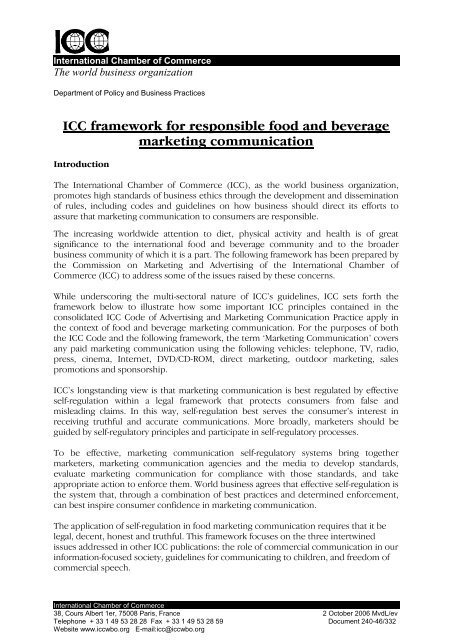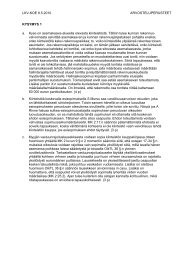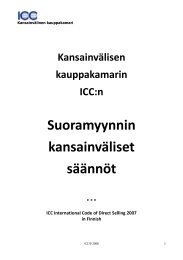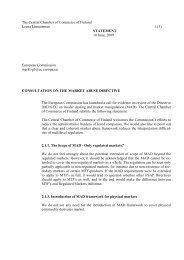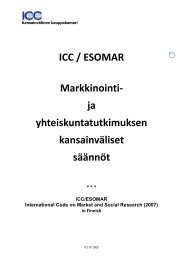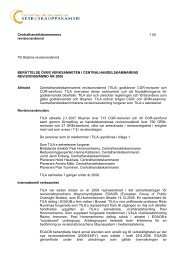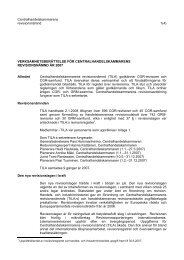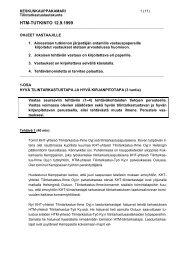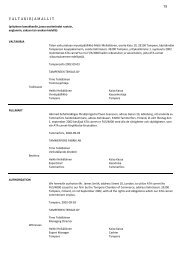The Framework for Responsible Food and Beverage ... - ICC
The Framework for Responsible Food and Beverage ... - ICC
The Framework for Responsible Food and Beverage ... - ICC
Create successful ePaper yourself
Turn your PDF publications into a flip-book with our unique Google optimized e-Paper software.
International Chamber of Commerce<br />
<strong>The</strong> world business organization<br />
Department of Policy <strong>and</strong> Business Practices<br />
<strong>ICC</strong> framework <strong>for</strong> responsible food <strong>and</strong> beverage<br />
marketing communication<br />
Introduction<br />
<strong>The</strong> International Chamber of Commerce (<strong>ICC</strong>), as the world business organization,<br />
promotes high st<strong>and</strong>ards of business ethics through the development <strong>and</strong> dissemination<br />
of rules, including codes <strong>and</strong> guidelines on how business should direct its ef<strong>for</strong>ts to<br />
assure that marketing communication to consumers are responsible.<br />
<strong>The</strong> increasing worldwide attention to diet, physical activity <strong>and</strong> health is of great<br />
significance to the international food <strong>and</strong> beverage community <strong>and</strong> to the broader<br />
business community of which it is a part. <strong>The</strong> following framework has been prepared by<br />
the Commission on Marketing <strong>and</strong> Advertising of the International Chamber of<br />
Commerce (<strong>ICC</strong>) to address some of the issues raised by these concerns.<br />
While underscoring the multi-sectoral nature of <strong>ICC</strong>’s guidelines, <strong>ICC</strong> sets <strong>for</strong>th the<br />
framework below to illustrate how some important <strong>ICC</strong> principles contained in the<br />
consolidated <strong>ICC</strong> Code of Advertising <strong>and</strong> Marketing Communication Practice apply in<br />
the context of food <strong>and</strong> beverage marketing communication. For the purposes of both<br />
the <strong>ICC</strong> Code <strong>and</strong> the following framework, the term ‘Marketing Communication’ covers<br />
any paid marketing communication using the following vehicles: telephone, TV, radio,<br />
press, cinema, Internet, DVD/CD-ROM, direct marketing, outdoor marketing, sales<br />
promotions <strong>and</strong> sponsorship.<br />
<strong>ICC</strong>’s longst<strong>and</strong>ing view is that marketing communication is best regulated by effective<br />
self-regulation within a legal framework that protects consumers from false <strong>and</strong><br />
misleading claims. In this way, self-regulation best serves the consumer’s interest in<br />
receiving truthful <strong>and</strong> accurate communications. More broadly, marketers should be<br />
guided by self-regulatory principles <strong>and</strong> participate in self-regulatory processes.<br />
To be effective, marketing communication self-regulatory systems bring together<br />
marketers, marketing communication agencies <strong>and</strong> the media to develop st<strong>and</strong>ards,<br />
evaluate marketing communication <strong>for</strong> compliance with those st<strong>and</strong>ards, <strong>and</strong> take<br />
appropriate action to en<strong>for</strong>ce them. World business agrees that effective self-regulation is<br />
the system that, through a combination of best practices <strong>and</strong> determined en<strong>for</strong>cement,<br />
can best inspire consumer confidence in marketing communication.<br />
<strong>The</strong> application of self-regulation in food marketing communication requires that it be<br />
legal, decent, honest <strong>and</strong> truthful. This framework focuses on the three intertwined<br />
issues addressed in other <strong>ICC</strong> publications: the role of commercial communication in our<br />
in<strong>for</strong>mation-focused society, guidelines <strong>for</strong> communicating to children, <strong>and</strong> freedom of<br />
commercial speech.<br />
International Chamber of Commerce<br />
38, Cours Albert 1er, 75008 Paris, France 2 October 2006 MvdL/ev<br />
Telephone + 33 1 49 53 28 28 Fax + 33 1 49 53 28 59 Document 240-46/332<br />
Website www.iccwbo.org E-mail:icc@iccwbo.org
<strong>The</strong> role of marketing communication in an in<strong>for</strong>mation-focused society<br />
Never has so much in<strong>for</strong>mation been as broadly <strong>and</strong> readily available to so many as it is<br />
now. This includes in<strong>for</strong>mation about healthy lifestyles, nutrition, <strong>and</strong> dietary choices<br />
that is available from a great number of sources, including marketing communication.<br />
<strong>Responsible</strong> marketing communication can assist consumers in making appropriate<br />
choices about food <strong>and</strong> beverage products, <strong>and</strong> in underst<strong>and</strong>ing the role of nutrition,<br />
diet <strong>and</strong> physical activity in healthy lifestyles. By conveying marketing communication<br />
consistent with principles of good nutrition, diet, physical activity <strong>and</strong> personal choice,<br />
business must play an important role.<br />
Good communication, <strong>and</strong> indeed good business practice, means that communicators<br />
must remain mindful of the need to provide honest <strong>and</strong> truthful in<strong>for</strong>mation about their<br />
products, both to make the consumer aware of the choices available <strong>and</strong> to enable the<br />
consumer to choose among them according to his needs, desires, tastes <strong>and</strong> personal<br />
priorities.<br />
Guidelines <strong>for</strong> marketing to children<br />
As children are consumers of food <strong>and</strong> beverages, they are legitimately a focus of<br />
marketing <strong>and</strong> have the right to in<strong>for</strong>mation about the products that interest them.<br />
However, because of their lack of experience as consumers, young children deserve<br />
especially careful treatment by marketers in any commercial communications directed to<br />
them. <strong>ICC</strong> recognizes that children constitute an audience with a more limited capacity<br />
to assess in<strong>for</strong>mation in marketing communication, which is why specific provisions on<br />
marketing communications to children are included in <strong>ICC</strong> guidelines <strong>and</strong> codes.<br />
Communicators must market <strong>and</strong> sell their products to children in a responsible manner.<br />
<strong>ICC</strong> remains mindful, however, that parents <strong>and</strong> other adults responsible <strong>for</strong> a child’s<br />
welfare play a primary role in the broad range of decisions affecting their children,<br />
including choices about diet, physical activity <strong>and</strong> health. Moreover, parents, educators,<br />
the media, entertainment content providers <strong>and</strong> others have important roles in helping<br />
children develop a critical underst<strong>and</strong>ing of marketing communication <strong>and</strong> other media<br />
messages so that they become better in<strong>for</strong>med.<br />
<strong>The</strong>se issues have been discussed at some length in the Compendium of <strong>ICC</strong> Rules on<br />
Children <strong>and</strong> Young People <strong>and</strong> Marketing, <strong>and</strong> these rules apply to food <strong>and</strong> beverage<br />
marketing communication as they do to any other type of marketing communication to<br />
children.<br />
Freedom of commercial speech<br />
Freedom of commercial speech in the sale of all legal products is a fundamental principle<br />
of free markets. This freedom has nourished competition among companies <strong>and</strong> led to<br />
demonstrable benefits to consumers. As companies compete, consumers are presented<br />
with a wider array of choices, more in<strong>for</strong>mation on which to base those choices <strong>and</strong><br />
better prices.<br />
But this exercise of freedom of speech, as with all rights, carries with it attendant<br />
obligations. <strong>ICC</strong> has long held that an essential element in freedom of commercial<br />
speech is responsibility.<br />
Document 240-46/332
Conclusion<br />
<strong>ICC</strong> encourages food <strong>and</strong> beverage communicators to adhere to principles of responsible<br />
consumer communication, above <strong>and</strong> beyond compliance with laws <strong>and</strong> regulations,<br />
especially in communicating to children. In doing so, marketing communication from<br />
this sector will meet its obligation to remain responsible as well as legal, decent, honest<br />
<strong>and</strong> truthful. <strong>Food</strong> <strong>and</strong> beverage marketers, <strong>and</strong> national <strong>and</strong> regional self-regulatory<br />
bodies, should continue to review <strong>and</strong> update their self-regulatory guidelines to assure<br />
that communications reflect contemporary st<strong>and</strong>ards of responsible marketing.<br />
Document 240-46/332
<strong>ICC</strong> PRINCIPLES<br />
GENERAL PROVISION ON ADVERTISING<br />
AND MARKETING COMMUNICATION<br />
PRACTICE<br />
APPLICATION TO FOOD AND<br />
BEVERAGE MARKETING<br />
COMMUNICATION<br />
Article 1<br />
All marketing communication should be<br />
legal, decent, honest, <strong>and</strong> truthful.<br />
Application in the context of food <strong>and</strong><br />
beverage marketing communication of<br />
this principle means that nutrition<br />
in<strong>for</strong>mation <strong>and</strong> claims about nutrition<br />
<strong>and</strong> health benefits should have a sound<br />
scientific basis. Claims should be<br />
conveyed consistent with the nature <strong>and</strong><br />
scope of the evidence, providing the<br />
consumer with supportable in<strong>for</strong>mation.<br />
Nutrition in<strong>for</strong>mation <strong>and</strong> claims should<br />
also be judged by the likely perception<br />
of the reasonable consumer, especially<br />
where children <strong>and</strong> young people are<br />
concerned.<br />
All marketing communications should be<br />
prepared with a due sense of social <strong>and</strong><br />
professional responsibility <strong>and</strong> should<br />
con<strong>for</strong>m to the principles of fair<br />
competition, as generally accepted in<br />
business.<br />
No marketing communication should be<br />
such as to impair public confidence<br />
ce in<br />
marketing.<br />
<strong>Food</strong> <strong>and</strong> beverage marketing<br />
communication should not encourage or<br />
condone excess consumption <strong>and</strong><br />
portion sizes should be appropriate to<br />
the setting portrayed.<br />
Marketing communication should not<br />
undermine the importance of healthy<br />
lifestyles.<br />
Marketing communication should<br />
respect the spirit of <strong>ICC</strong>, local <strong>and</strong><br />
sectoral self-regulatory codes, in order to<br />
maintain confidence both in marketing<br />
communication <strong>and</strong> in the selfregulation<br />
system.<br />
Article 3<br />
Marketing communication should be so<br />
framed as not to abuse the trust of<br />
consumers or exploit their lack of<br />
experience or knowledge.<br />
Where claims or terminology used in<br />
marketing communication might<br />
reasonably be interpreted by a consumer<br />
as health or nutrition claims, they should<br />
be supportable with appropriate<br />
scientific evidence.<br />
Document 240-46/332
<strong>ICC</strong> PRINCIPLES<br />
GENERAL PROVISION ON<br />
ADVERTISING AND MARKETING<br />
COMMUNICATION PRACTICE<br />
APPLICATION TO FOOD AND<br />
BEVERAGE MARKETING<br />
COMMUNICATION<br />
Article 5<br />
Marketing communication should not<br />
contain any statement, or audio or visual<br />
treatment which, directly or by<br />
implication, omission, ambiguity or<br />
exaggeration, is likely to mislead the<br />
consumer, in particular, but not<br />
exclusively, with regard to:<br />
Characteristics of the product which are<br />
material, i.e. likely to influence the<br />
consumer’s choice, such as: nature,<br />
composition, method <strong>and</strong> date of<br />
manufacture, range of use, efficiency <strong>and</strong><br />
per<strong>for</strong>mance, quantity, commercial or<br />
geographical origin or environmental<br />
impact.<br />
Copy, sound <strong>and</strong> visual presentations in<br />
marketing communication <strong>for</strong> food <strong>and</strong><br />
beverage products should accurately<br />
represent the material characteristics of<br />
the product featured, such as taste, size,<br />
content nutrition or health benefits, <strong>and</strong><br />
should not mislead consumers<br />
concerning any of those characteristics.<br />
<strong>Food</strong> products not intended to be<br />
substitutes <strong>for</strong> meals should not be<br />
represented as such.<br />
Article 6<br />
Marketing communication should not:<br />
- misuse technical data, e.g.<br />
research results or quotations<br />
from technical <strong>and</strong> scientific<br />
publications;<br />
- present statistics in such a way as<br />
to exaggerate the validity of a<br />
product claim;<br />
- use scientific terminology or<br />
vocabulary in such a way as falsely<br />
to suggest that a product claim<br />
has scientific validity.<br />
All nutritional <strong>and</strong> health-benefit<br />
in<strong>for</strong>mation <strong>and</strong> claims <strong>for</strong> food <strong>and</strong><br />
beverage products should have a sound<br />
scientific basis.<br />
Consumer taste or preference tests<br />
should not be used in a way that might<br />
imply statistical validity if there is none.<br />
Testimonials should be based on well<br />
accepted <strong>and</strong> recognized opinion from<br />
experts.<br />
Document 240-46/332
<strong>ICC</strong> PRINCIPLES<br />
GENERAL PROVISION ON<br />
ADVERTISING AND MARKETING<br />
COMMUNICATION PRACTICE<br />
APPLICATION TO FOOD AND<br />
BEVERAGE MARKETING<br />
COMMUNICATION<br />
Article 17<br />
Marketing communication should not,<br />
without justification on educational or<br />
social grounds, contain any visual<br />
portrayal or any description of<br />
potentially dangerous practices, or<br />
situations which show a disregard <strong>for</strong><br />
safety or health, as defined by local<br />
national st<strong>and</strong>ards. Instructions <strong>for</strong> use<br />
should include appropriate safety<br />
warnings <strong>and</strong>, where necessary,<br />
disclaimers. Children should be shown<br />
to be under adult supervision whenever<br />
a product or an activity involves a safety<br />
risk.<br />
<strong>Food</strong> <strong>and</strong> beverage marketing<br />
communication should not undermine<br />
the promotion of healthy balanced diets,<br />
nor the importance of a healthy active<br />
lifestyle.<br />
Article 18<br />
<strong>The</strong> following provisions apply to<br />
marketing communication addressed to<br />
children <strong>and</strong> young people, as defined in<br />
national laws <strong>and</strong> regulations relevant to<br />
such communications.<br />
Inexperience <strong>and</strong> Credulity<br />
Marketing communication should not<br />
exploit inexperience or credulity, of<br />
children <strong>and</strong> young people.<br />
Marketing communication directed<br />
towards children <strong>for</strong> food <strong>and</strong> beverage<br />
products should not create a sense of<br />
urgency, or inappropriate price<br />
minimisation.<br />
While fantasy, including animation is<br />
appropriate in communication with<br />
younger as well as older children, care<br />
should be taken not to exploit a child’s<br />
imagination in a way that could mislead<br />
him/her about the nutritional benefits of<br />
the product involved.<br />
Document 240-46/332
<strong>ICC</strong> PRINCIPLES<br />
GENERAL PROVISION ON<br />
ADVERTISING AND MARKETING<br />
COMMUNICATION PRACTICE<br />
APPLICATION TO FOOD AND<br />
BEVERAGE MARKETING<br />
COMMUNICATION<br />
Social Values<br />
Marketing communication should not<br />
suggest that possession or use of the<br />
promoted product will give a child or<br />
young person physical, psychological or<br />
social advantages over other children or<br />
young people, or that not possessing the<br />
product will have the opposite effect.<br />
Marketing communication should not<br />
undermine the authority, responsibility,<br />
judgement or tastes of parents, having<br />
regard to relevant social <strong>and</strong> cultural<br />
values.<br />
Marketing communication should not<br />
include any direct appeal to children <strong>and</strong><br />
young people to persuade their parents<br />
or other adults to buy products <strong>for</strong><br />
them.<br />
<strong>Food</strong> <strong>and</strong> beverage marketing<br />
communication should not mislead<br />
consumers about potential health or<br />
other benefits from the consumption of<br />
the advertised product. In marketing<br />
communication to children or young<br />
people, this includes such things as<br />
status or popularity with peers, success<br />
in school or sports, or intelligence.<br />
<strong>Food</strong> product marketing communication<br />
should not undermine the role of<br />
parents <strong>and</strong> other adults responsible <strong>for</strong><br />
a child’s welfare in guiding diet <strong>and</strong><br />
lifestyle choices.<br />
Advertisements should not include any<br />
direct appeal to children to persuade<br />
their parents or other adults to buy<br />
advertised products <strong>for</strong> them.<br />
ARTICLE 18 <strong>and</strong> ARTICLE A6 (Sales<br />
Promotions)<br />
Marketing communication should not<br />
exploit the inexperience or credulity of<br />
children <strong>and</strong> young people. Sales<br />
promotions should be presented in such<br />
a way that they are made aware, be<strong>for</strong>e<br />
making a purchase, of any conditions<br />
likely to affect their decision to<br />
purchase.<br />
Sales promotion offers addressed to<br />
children should provide the conditions<br />
of the premium offer, sweepstake or<br />
contest being advertised in terms that<br />
children can underst<strong>and</strong>.<br />
Marketers should strive to be sure that<br />
young children have an underst<strong>and</strong>ing of<br />
the products to be purchased, if any, to<br />
receive the premium; <strong>and</strong> <strong>for</strong><br />
sweepstakes <strong>and</strong> contests, the<br />
conditions of entry, types of prizes <strong>and</strong><br />
the likelihood of winning.<br />
Document 240-46/332


